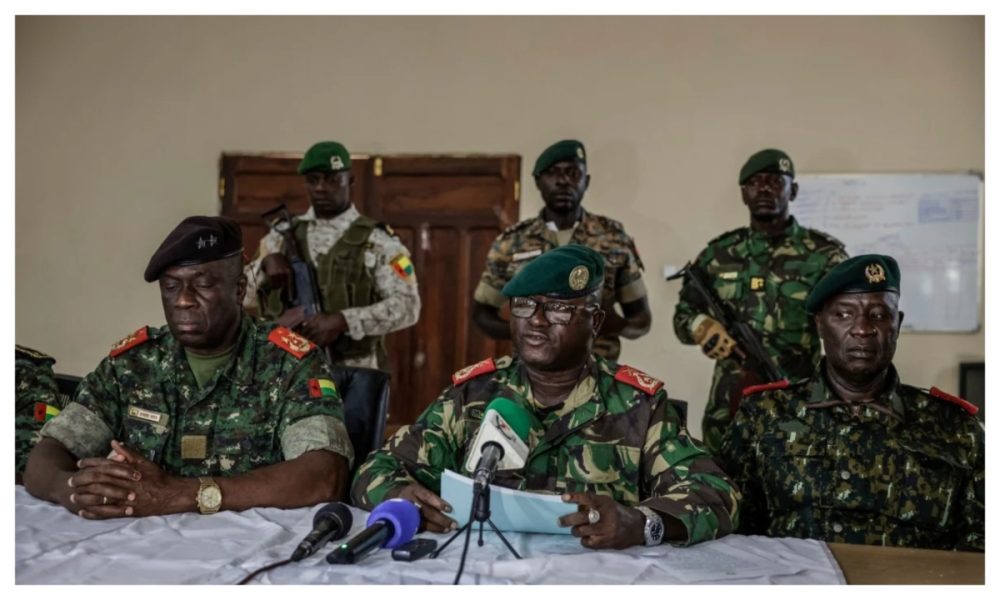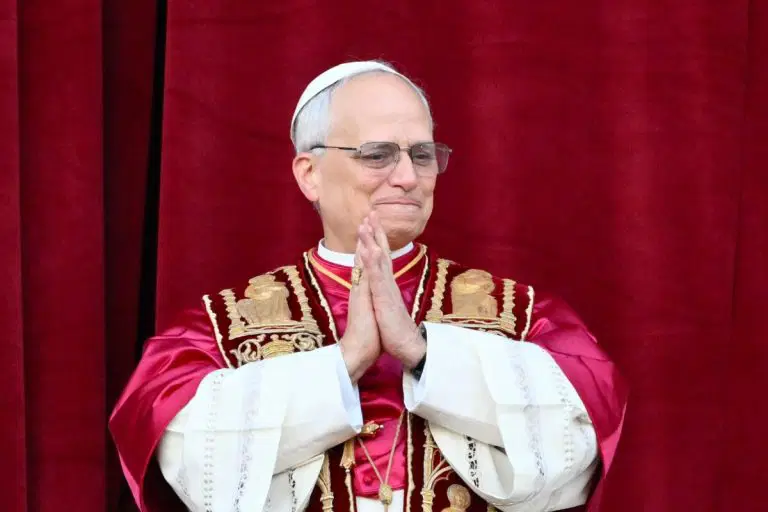Headline
Gabon: Seven Longest Serving Presidents In Africa

Another coup has struck in Africa. This time, it is Gabon where a group of army officers announced they had put an end to the combined 56-year reign of both Omar Bongo and his son, Ali, in the Central African country.
According to the putschists, they were annulling the results of Saturday’s election in which President Ali Bongo got an extension to his 14-year reign.
If successful, it will be the 10th coup de tat on the continent with the most recent being Niger Republic.
One reason many analysts have given for the now-frequent coups on the continent is the perpetuity of some African leaders in power. In number terms, there are seven African Presidents who have been in power for over 20 years.
In this, piece, PUNCH takes a look at these longest-serving presidents on the continent.
READ ALSO: Gabon: A List Of Recent Military Coups In Africa
1. Teodoro Obiang Nguema Mbasogo (44 years)
Teodoro Obiang Nguema Mbasogo of Equatorial Guinea has been in power since 1979, making him the longest-serving African president. In the early years of his rule, President Obiang was known for being a brutal dictator. He oversaw a government responsible for the torture and killings of political opponents.
In the past few years, President Obiang has come under fire from human rights groups for his continued repression of the people of Equatorial Guinea.
2. Paul Biya (42 years)
Cameroon’s Paul Biya reign is not ending anytime soon.
President Biya, who came to power in a coup d’etat in 1982, has ruled the country ever since. In the early years of his rule, he was known for being a repressive leader.
In the 1990s, he loosened his grip on the country and allowed multiparty elections. However, he has remained in power ever since.
President Biya has had his fair share of trouble with human rights groups for his continued repression of the people of Cameroon.
READ ALSO: Coup: Why We Took Over Power — Gabon Army
3. Denis Sassou (36 years)
Denis Sassou has been the president of the Republic of the Congo for 36 years. He first came to power in 1979 and has since been re-elected three times. Sassou is currently among the oldest heads of state in Africa, at 80.
His over three decades in power have attracted criticism and allegations, from corruption to poor governance and human rights violations. However, to him, that has never been any reason enough to call it quits.
4. King Mswati III (36-year rule)
Eswatini, Africa’s last remaining absolute monarchy, has been ruled by King Mswati III for 36 years. He ascended to the throne in April 1986 aged just 18
5. Yoweri Museveni (35 years)
Yoweri Museveni has been the president of Uganda for 35 years. He first came to power in 1986 and has since been re-elected three times. Museveni is the third oldest head of state in Africa, at 79.
Critics say Museveni has become increasingly authoritarian over the years, stifling dissent and curtailing civil liberties.
In recent years, there have been calls for term limits in Uganda, but Museveni has resisted these efforts. In 2017, he amended the constitution to remove the president’s age limit, effectively allowing him to stay in power for life.
6. Isaias Afwerki (30 years)
Isaias Afwerki has been the president of Eritrea for 30 years. He first came to power in 1993 after leading the country’s independence movement from Ethiopia. Afwerki has since been re-elected twice.
READ ALSO: JUST IN: Gun Battle In Gabon As Soldiers Seize Power
Eritrea is also one of the world’s most militarised countries, with all able-bodied citizens required to serve in the military. This has led to a mass exodus of Eritreans, with many fleeing the country for safety and opportunity elsewhere.
7. Paul Kagame (23 years)
Rwanda’s leader, Paul Kagame is standing for re-election in 2024. He has been in power since 2000.
In 2015 the constitution was changed, allowing him to stay until 2034.
In the last presidential election six years ago, official figures showed he won 99% of the vote, which many outside the country dismissed as a sham.
Asked if he would seek re-election, Kagame said: “I will consider running for another 20 years. I have no problem with that. Elections are about people choosing.”
Headline
Coup: Guinea-Bissau Junta Releases Six Held Opposition Politicians

Guinea-Bissau’s ruling junta on Tuesday released six members of the political opposition who had been detained since a coup last month.
The six freed opposition members are said to be close associates of Domingos Simoes Pereira, head of the PAIGC party that led the country to independence in 1974.
Pereira has been in custody since the coup.
In a statement by the High Military Command, the junta’s governing body, the releases are described as a sign of good faith and a step towards the return to constitutional normality and respect for international rights.
READ ALSO:Why West African Troops Overturned Benin’s Coup But Watched Others Pass
The army seized power on 26 November after ousting outgoing President Umaro Sissoco Embalo in the wake of a presidential vote.
After taking over, the military suspended the electoral process and announced it would take control of the West African country for a period of one year.
Recall that another opposition candidate, Fernando Dias, took refuge in Nigeria’s embassy, which granted him asylum, while Embalo fled the country after being briefly detained by the military at the time of the coup.
Meanwhile, Senegal’s Foreign Minister, Cheikh Niang, led a delegation to Guinea-Bissau, where he met with detained opponents and requested their release.
Headline
7 Territories Still Under Colonial Rule

Even though most nations became independent in the last century, some territories are still ruled by other nations.
Contents
1. Western Sahara
2. Guam
3. American Samoa
4. United States Virgin Islands
5. Falkland Islands / Malvinas
6. Gibraltar
7. Bermuda
Many of them remain on the United Nations list of non-self-governing territories, meaning they have not completed the process of decolonization. These places usually depend on bigger countries for laws, passports, defence, or political control.
In this article, Nigerian Tribune highlights 7 territories still under colonial rule:
READ ALSO:Nigeria Ranks World’s 102nd Happiest Nation, US, Germany Not Among 20 Top Counties
1. Western Sahara
Western Sahara remains one of the world’s biggest unresolved colonial issues. Morocco controls most of the territory, but the Polisario Front wants independence for the Sahrawi people. The UN is still trying to help both sides agree on a peaceful solution.
2. Guam
Guam is an important US territory in the Pacific, used heavily for American military operations. The US oversees its defence and foreign relations.
People living there are US citizens, but they cannot vote in presidential elections and do not have full representation in Congress.
READ ALSO:FULL LIST: US To Review Green Cards From 19 ‘Countries Of Concern’ After Washington Shooting
3. American Samoa
American Samoa has more local control than Guam, but the United States still decides immigration, defence, and foreign affairs.
Residents are considered US nationals and must apply if they want full citizenship.
4. United States Virgin Islands
The US Virgin Islands have their own legislature, but the United States makes major constitutional and political decisions. The territory depends heavily on US federal support.
5. Falkland Islands / Malvinas
The Falkland Islands remain controlled by the United Kingdom (UK), but Argentina has long disputed this claim, having been in control of the Islands for a few years before 1833.
The people living there voted strongly to stay British, yet the sovereignty dispute continues to appear in the UN.
READ ALSO:Six Countries With Highest Number Of Billionaires In 2025
6. Gibraltar
Gibraltar sits at the Southern tip of Spain. The United Kingdom controls it, but Spain insists the territory belongs to them.
Gibraltarians have repeatedly voted in favour of remaining British, but the dispute is still discussed within the UN Decolonisation Committee.
7. Bermuda
Bermuda is a British Overseas Territory situated in the North Atlantic Ocean. Although it manages most of its own internal affairs and enjoys a strong economy with modern facilities, the United Kingdom still handles its defence and represents it in global matters.
Headline
Russia-Ukraine War: Pope Leo Calls For Global Christmas Truce

Pope Leo XIV on Tuesday renewed his call for a global truce on Christmas Day, saying he felt “great sadness” after Russia “apparently rejected a request” for a pause in fighting.
Speaking to reporters at his residence in Castel Gandolfo near Rome, the Pope urged all sides involved in conflict to observe at least one day of peace.
“I am renewing my request to all people of goodwill to respect a day of peace — at least on the feast of the birth of our Saviour,” Leo said.
Recall that Russia invaded Ukraine in February 2022 and has repeatedly turned down calls for a ceasefire, arguing that any pause would give Ukraine a military advantage.
READ ALSO:Russian Strikes Kill Five In Ukraine, Cause Power Outages
“Among the things that cause me great sadness is the fact that Russia has apparently rejected a request for a truce,” the pope said.
Referring to conflicts worldwide, Leo added, “I hope they will listen and there will be 24 hours of peace in the whole world.”
The appeal came as fighting continued in eastern Ukraine. On Tuesday, Ukrainian forces withdrew from a town after heavy battles with Russian troops. Russian strikes killed three civilians and left thousands without power during winter temperatures.
READ ALSO:Trump Blasts Ukraine For ‘Zero Gratitude’ Amid Talks To Halt War
There was no indication of progress toward ending the war after separate meetings last weekend in Miami between the United States officials and negotiators from Russia and Ukraine. The conflict is nearing four years with no settlement in sight.
Earlier this month, Pope Leo met Ukrainian President Volodymyr Zelensky. When asked whether he would accept Zelensky’s invitation to visit Ukraine, the pope said, “I hope so,” while noting that it was not possible to say when such a visit could happen.
Leo also warned that efforts to secure peace without European diplomatic involvement were “unrealistic”, expressing optimism that President Donald Trump’s proposed peace plan could bring a “huge change” to the transatlantic alliance.

 News3 days ago
News3 days agoPHOTOS: New Era In Furupagha-Ebijaw As Okpururu 1 Receives Staff Of Office

 News2 days ago
News2 days agoUBTH CMD Marks 120 Days In Office, Expresses Commitment To Providing Conducive Working Environment

 News3 days ago
News3 days agoFG Declares Public Holidays For Christmas, New Year Celebrations

 News3 days ago
News3 days agoOPINION: Gumi And His Terrorists

 News2 days ago
News2 days agoFIRS Confirms NIN As Tax ID

 News2 days ago
News2 days agoOPINION: My Man Of The Season

 Metro2 days ago
Metro2 days agoFintiri Pardons Man Sentenced To Death For ‘Killing Herdsman In Self-defence’, Others

 News3 days ago
News3 days agoOPINION: Christmas And A Motherless Child

 News2 days ago
News2 days agoKWAM 1 Withdraws From Awujale Race, Ends Court Challenge

 Metro2 days ago
Metro2 days agoPetrol Tanker Crashes Into Akpabio’s Convoy, Kills Police Dispatch Rider


























